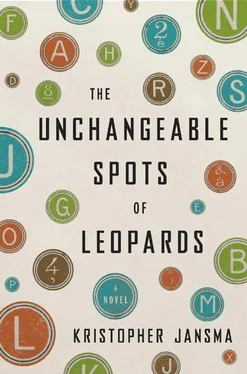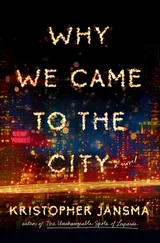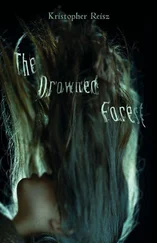Oh, how she pries ! Like a little insect, trying to find some purchase — some hole that she can nestle into.
“If you were German then it’d be a sign of bad luck.”
“Not Norwegian or German,” I snap. “And we can hardly have more bad luck.”
“You could ,” she says drily. “It’s supposed to be a portent of your own death. Elizabeth I saw herself lying on her own bed. Later that night she died in her sleep. And then Donne? John Donne? He saw his wife’s right before she had a miscarriage.”
“‘Mark but this flea, and mark in this… ’” I proclaim, the words coming back to me from a freshman seminar, long ago. Rising up from our booth with beer mug in hand, I wave it out to the room. “‘How little that which thou deny’st me is; Me it suck’d first, and now sucks thee. And in this flea our two bloods mingled be… ’”
The bartender shouts something like “Oi!” at me and tells me to sit. The yellowed eyes of four dusty Ghanaian guys all level at me. They are trying to watch a soccer match, can’t I see that? Tina gives me a small sarcastic clap as I sit back down.
“Did you and Jeffrey used to recite poetry together?” she asks, relentless. “Was that how you used to get the princess into bed?”
I ding an imaginary bell on the bar table. “Check, please.”
“Oh, quit it. Just a joke. I’d have held out longer, is all I’m saying, if I knew you recited poetry.”
I give her a skeptical look. Tina and I had leaped into bed together the first night we’d known each other, after a train ride that had left us both on edge. Maybe that was the problem. Maybe it had just been too easy. Maybe she was still simply too available.
“Oh! I almost forgot! Wilkie Collins!”
“Everyone always forgets Wilkie Collins,” I quip.
“No, I mean for doppelgängers . Supposedly he kept seeing a ‘Ghost Wilkie’ running around London for ten years, on and off.”
“Well, that was probably on account of all of the laudanum.”
“And wasn’t there a story about Shelley… ”
“Stop it,” I groan. “I don’t want to hear about Shelley. I’m dying .”
She pats my hand again. “You’re not going to die. Not unless I kill you for making me stay here another week. Now let’s find the old man some yams.”
And with an apologetic clink of our glasses, we exit O’Bryan’s and venture back to the dreaded marketplace. All the while I am scanning the strangers around me for some sign of myself.
• • •
Jeffrey Oakes, author of the luminous Nothing Sacred , has made no media appearances, given not a single interview — even to Oprah — and has accepted not a single prize or honor in nine years, though he’s won several. For those somehow unfamiliar, Nothing Sacred had the rare quality of seeming like a classic on the day it was first printed, with a clever consortium of low-lying postmodern puzzles to occupy the highbrow and heartfelt hijinks to captivate the lowbrow. It is the rare sort of book that resembles nothing else and yet somehow seems intensely familiar. From the first line you feel your own heart begin to beat differently. Once it’s over you want to begin it again. It is a love letter; it is an atom bomb; it is literature we’d forgotten could be written.
Only now, after eight years with no follow-up, eager critics have begun to claim that Jeffrey’s relentless dedication to his art must have pushed him over the brink — that the pressure to measure up to Nothing Sacred has undone its creator. Certain loyal factions speculate that he is, actually, hiding away only to create more of a frenzy about his next novel. If he is, it certainly appears to be working: the latté-shop gossip rages on. Some believe Oakes is merely doing research and that he is furiously crafting his next masterpiece in a padded room somewhere. Others believe that it is all a stunt. Some believe that he’s gone full-Salinger; that he will never resurface, not even if they give him the Booker Prize for the next book — which most everyone agrees it was a crime that he did not win last time, despite the fact that he has not lived in England for nearly twenty-five years, and though he was born there, even his parents have now officially relocated to France. I wonder if I’ll dash his chances when I verify, in the tenth chapter of his biography, that he once flung his EU passport into the Hudson, to protest the cancellation of his favorite BBC children’s television program. Still, each month Nothing Sacred remains on the bestseller lists and the flames are fueled further.
This is why my editor has brought me here to the Gold Coast — to the “White Man’s Grave”—to the “least-failed state” in Africa: the Republic of Ghana, where the oldest of the Oakes still resides. Jeremiah Oakes, Jeffrey’s beloved grandfather, lives thirty miles outside of Kumasi, near the sacred Lake Bosumtwi, where Jeffrey spent his childhood summers playing around in the catacomb of Ghanaian gold mines, which had been in his family’s possession since colonial days.
Now the mines are run by the KMS Mining Corporation, and Jeremiah Oakes remains only because he refuses to go. He has lived in Africa nearly all his life, and I imagine he’d prefer to die there than leave. As Jeffrey’s first exposure to the literary dimensions, the old man is all I need to fill in the last remaining sections of my illuminating biography — for which the world waits impatiently. This has unfortunately proved more difficult than I anticipated.
As I come up the long driveway to the Oakes Mines & Estate, my driver, Kojo, swerves his rusty Hyundai to avoid an incoming rifle shot. A hundred yards away, on his sagging porch, Jeremiah Oakes wobbles from the blowback of his ancient firearm. Fortunately, he is almost as blind as he is senile. Before he can regain his footing and reload the rifle, I am out of the car rushing at him with the yams raised.
“It’s me!” I shout, as the dust from the car settles. From somewhere around the house, his two housekeepers, Efua and Akuba, come running. When they see it is I, they are only slightly less annoyed. They glare at me as they call out to Kojo in singsong Twi. All three speak English quite well; they converse in Twi only when I’m around if they don’t want me to know that they think I am a liar and a thief. Which I am.
“Jeffrey!” shouts the old man. “Come on inside! I’ve been traveling! There’s so much I need to show you.”
The old man has no more been traveling than I am his grandson, but I do not dissuade him of either delusion. Lowering my yams, I once more trudge up the creaking steps that lead into the crumbling House of Oakes.
Inside, the air is full of flies, and Jeremiah leads the way back to the room he calls his “study.” A room where he wrote six or seven novels, back in the late seventies, none of which is still in print. I have tracked them all down and read them all cover to cover. They remind me a bit of my own efforts: not bad, but not Jeffrey.
A gigantic fan revolves lazily above our heads, sending just enough cool air down to bristle the photographs and scraps of newspaper he has pinned on every walled surface: old illustrations from books of World War II submarines, articles in Spanish about boys killed during the running of the bulls, and tattered letters handwritten in Hebrew. On a long, narrow desk sits a typewriter — the same faint-inked thing that Jeffrey typed his first stories on — and beside it, thin bundles of monogrammed paper, stolen from hotels worldwide, some of which haven’t existed since the 1950s. There are guns everywhere — some antique showpieces and some roadside finds. Some loaded; some not. The floor is covered with skins: a warthog, a zebra, a lioness, and an antelope — most of which, according to Jeremiah, escaped from the preserve and came waltzing right in through the wide set of French doors, which he leaves open, day or night, to the terrace outside. The jungle is a hundred yards away.
Читать дальше











